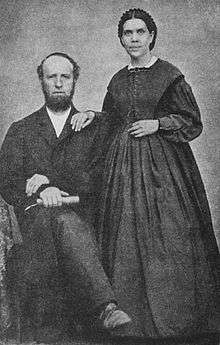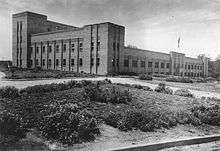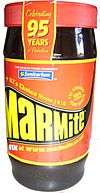Sanitarium Health and Wellbeing Company
 | |
| Private | |
| Industry | Food |
| Founded | Melbourne, Victoria 1898 |
| Headquarters |
Berkeley Vale, New South Wales, Australia Auckland, New Zealand |
Key people | Kevin Jackson, CEO |
| Products |
Weet-Bix Up & Go Peanut butter So Good Marmite |
| Revenue | A$300 million |
Number of employees | 1700 |
| Website |
Sanitarium Australia Sanitarium New Zealand |
| Part of a series on |
| Seventh-day Adventist Church |
|---|
 |
|
Adventism Seventh-day Adventist portal |
The Sanitarium Health & Wellbeing Company is the trading name of two sister food companies (Australian Health and Nutrition Association Ltd[1] and New Zealand Health Association Ltd).[2] Both are wholly owned by the Seventh-day Adventist Church.[3]
Founded in Melbourne, Victoria in 1898, Sanitarium has factories in a number of locations across Australia and New Zealand, producing a large range of breakfast cereals and vegetarian products. All the food products it manufactures and markets are plant derived or vegetarian.
Its flagship product is Weet-Bix, a top-seller in the Australian and New Zealand breakfast cereal market.
Sanitarium launched soy milk under the brand So Good in 1985 and has maintained market leadership of the soy milk category in supermarket in both Australia and New Zealand.
Up&Go, a breakfast drink, was launched in 1997 is a successful and growing brand in the breakfast cereal category in both Australia and New Zealand.
Sanitarium has produced and marketed many food products throughout its 100+ year history including peanut butter, vegetarian meals, snacks and beverages.
The company also operated health food shops in a number of cities, closing them in the 1980s.
History

During her time in Australia, pioneer Adventist Ellen G. White's son Willie convinced Seventh-day Adventist Edward Halsey, a baker at John Harvey Kellogg's Battle Creek Sanitarium, to immigrate to Australia.[4][5]
Halsey arrived in Sydney, New South Wales, on 8 November 1897.[6] He rented a small bakery in Melbourne, and produced Granola (made of wheats, oats, maize and rye) and Granose (the unsweetened forerunner to Weet-Bix). He and his team sold it from door to door as an alternative to fat-laden or poor nutritious foods popular at the time.
The business relocated to larger premises in Cooranbong, New South Wales.[3][6]
In 1900, Halsey transferred to New Zealand where he began making the first batches of Granola, New Zealand's first breakfast cereal, Caramel Cereals (a coffee substitute) and wholemeal bread in a small wooden shed[7] in the Christchurch suburb of Papanui.[8][9]
Sanitarium New Zealand and Sanitarium Australia are now separate companies, but work together.[8]
Sanitarium has factories in a number of locations across Australia and New Zealand, including Berkeley Vale and Cooranbong in New South Wales; Carmel in Perth, Western Australia; Brisbane, Queensland; Christchurch; and Auckland. Weet-Bix was originally manufactured, from 1928, at 659 Parramatta Road, Leichhardt where until recent times Sanitarium signage could still be seen. This factory predates the purchase of Weet-Bix by Sanitarium in 1930. A factory was operating in Palmerston North in New Zealand, but closed in the late 1990s. The Hackney factory in Adelaide, South Australia was closed in October 2010.
Tax exemption
Neither the Australia nor the New Zealand Sanitarium companies pay company tax on their profits, due to their ownership by a religious organisation.[10][11] On their official website Sanitarium defend their tax exemption with several points, stating they operate exclusively for charitable purposes, and that income tax exemptions are available to all companies and individuals in New Zealand who limit themselves to charitable purposes.[12]
However, the exemption has been criticised[13][14] and is considered unfair by their competitors.[15]
Distributions in the past financial year included $5.7 million to the agency, $4 million in aged care expenses and $182.5 million for "nutrition, wellbeing and health food activities expenses", according to the accounts, which reported a net surplus of $3 million.
The church's group one accounts booked total income of $204.8 million last year, which included $4.3 million in government grants and $5.9 million in donations.[16]
Products
Breakfast beverages
Up & Go is the brand of a range of liquid breakfast products manufactured and marketed by Sanitarium Health and Wellbeing Company. The brand was the first product that established the category of liquid breakfast in supermarket and convenience stores in Australia and New Zealand. Many other brands have entered the category since the late 1990s and forced the brand to defend its market share.[17]
In June 2013, Choice magazine released a study of 23 liquid breakfast products questioning the validity of claims that were made by manufacturers including Up & Go claims regarding fiber content.[18] Sanitarium defended Up & Go in a release citing the current code of practice for nutrient claims that a product must contain a minimum of 3g of dietary fiber per serve to be considered "high in fiber" and Up & Go contained 3.8g of fiber per 250ml serving.[19]
Breakfast cereals
- Weet-Bix, and its family of products:
- Weet-Bix Bites Wildberry
- Weet-Bix Bites Crunch Honey
- Weet-Bix Bites Apricot
- Weet Bix Bites Energize
- Weet Bix Multi-Grain
- Weet-Bix Oat Bran
- Weet-Bix Hi-Bran
- Weet-Bix Energize Hi-Protein
- Granola
- Granola Clusters
- Puffed wheat
- Honey Weets
- Skippy Corn flakes
- Skippy Ricies
- Light'n'tasty
- Muesli range (toasted, natural)
- Cluster Crisp Range (Toasted Oat Cereal)
- Weeties (relaunched 2008, previously kornies)
- Double Crunch Apple and Cinnamon (NZ)
- Double Crunch Apricot (NZ)
- GHF Vita Brits (NZ only)
- GHF Toasted Muesli (NZ)
- Fibre life Range
- Bran Bix
- Honey Puffs
Some older names, no longer produced:
- Gravy Quick
- NrG Cereal (NZ)
- Good Morning (NZ)
- Stamina (NZ)
- Maximize
- Lite Bix (NZ)
- Banana Ricies
- Favoured Water
Meals
- Deli Luncheon
- Breakfast&Lunch Today
Spreads
- Sanitarium Peanut Butter
- Peanuts Peanut Butter (USA)
- Natural Peanut Butter
- Marmite (NZ & Aus)
- Vitamite (Aus)

Dairy alternatives
- So Good and its family of products:
- So Good Coconut Milk
- So Good Ice Cream
- So Good Lite
- So Good Almond Milk
- Flavoured So-Good
- Organics Simply Soy
- Rice Milk
Meat alternatives
- Vegie Delights range, which includes four kinds of vegan sausages
- Savoury Lentils
- Tender Pieces
- Casserole Mince
- Country Hotpot
- Vegetarian Sausages
- Nutmeat
- Nutolene
- Rediburger
- Sanitarium brand nuts and confectionery
Yogurt
- Up & Go Breakfast Yoghurt
See also
References
- ↑ "Australian Health and Nutrition Association Ltd", Bloomberg
- ↑ "...New Zealand Health Association Limited trading as Sanitarium Health and Wellbeing Company...", sanitarium.co.nz
- 1 2 "Sanitarium Health Food Company". Adventist.org. Archived from the original on 19 November 2010.
- ↑ "Peddling Health". Adventistreview.org. 6 June 2002.
- ↑ Crook, Edgar. "Vegetarianism in Australia, A History" (PDF). Ivu.org. Archived from the original (PDF) on 16 June 2010.
- 1 2 "Moments that made us". Sanitarium.com.au.
- ↑ "Edward Halsey's Sanitarium Red Shed". Ketechristchurch.peoplesnetworknz.info. Retrieved 2012-09-13.
- 1 2 "History". Sanitarium.co.nz.
- ↑ "Spreads and breakfast cereals". Teara.govt.nz.
- ↑ "Charities Services". Retrieved 2 November 2014.
- ↑ "New Zealand Health Association Limited (1503254) Registered". New Zealand Companies Office. Retrieved 2 November 2014.
- ↑ "Sanitarium gives its profits for charitable purposes". Sanitarium Health and Wellbeing Company. Retrieved 4 May 2013.
- ↑ Wallace, Max (8 August 2008). "Render unto Caesar". The Australian. Retrieved 16 August 2011.
- ↑ Gomez, Frank (18 April 2011). "Rich men in the tax-free kingdom of God". thepunch.com.au. Retrieved 16 August 2011.
- ↑ Blundell, Sally (2 February 2008). "The God dividend". listener.co.nz. Retrieved 16 August 2011.
- ↑ Adams, Christopher (23 February 2015). "Sanitarium safe from charity crackdown".
- ↑ "Liquid breakfasts: up and going strong". Retrieved 16 October 2014.
- ↑ "Liquid breakfasts should up and go". Retrieved 16 October 2014.
- ↑ "'Up & Go claims are healthy', Sanitarium hits back at Choice". Food Magazine. Retrieved 16 October 2014.
Further reading
- Parr, R., & Litster, G. (1996). "What Hath God Wrought!": The Sanitarium Health Food Company Story. Sanitarium Health Food Company. ISBN 0646259792. 463 pages.